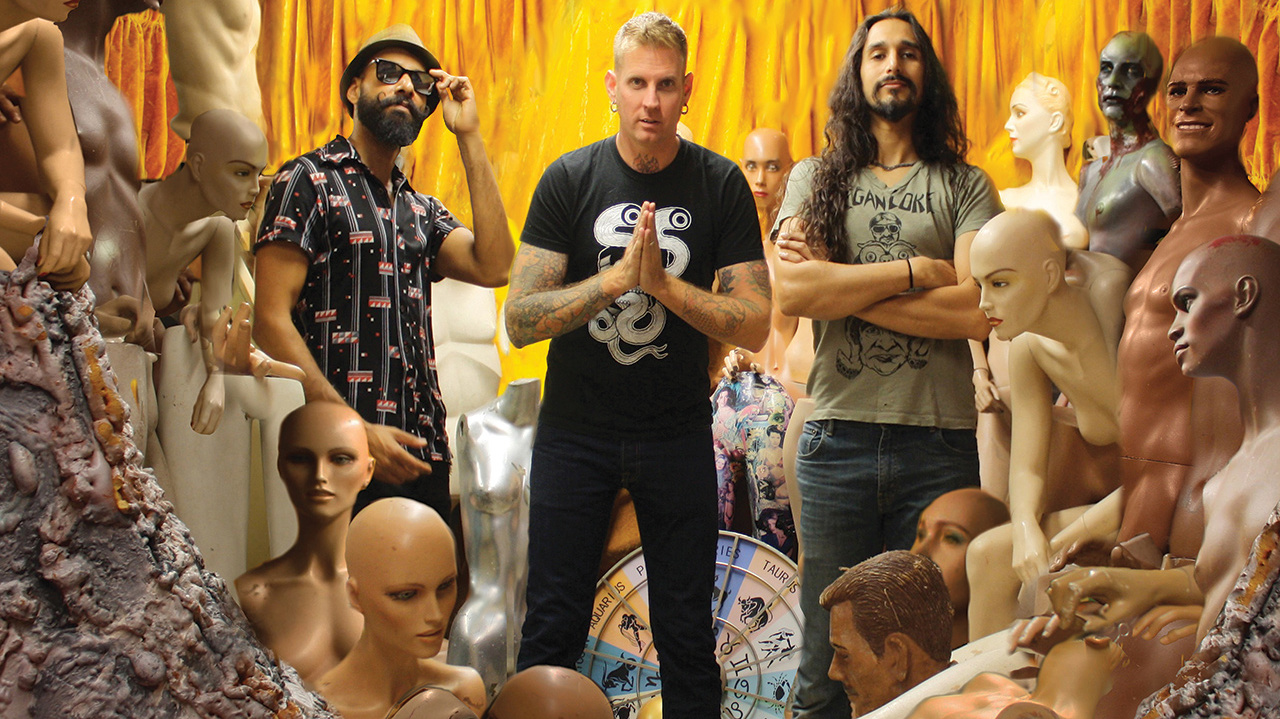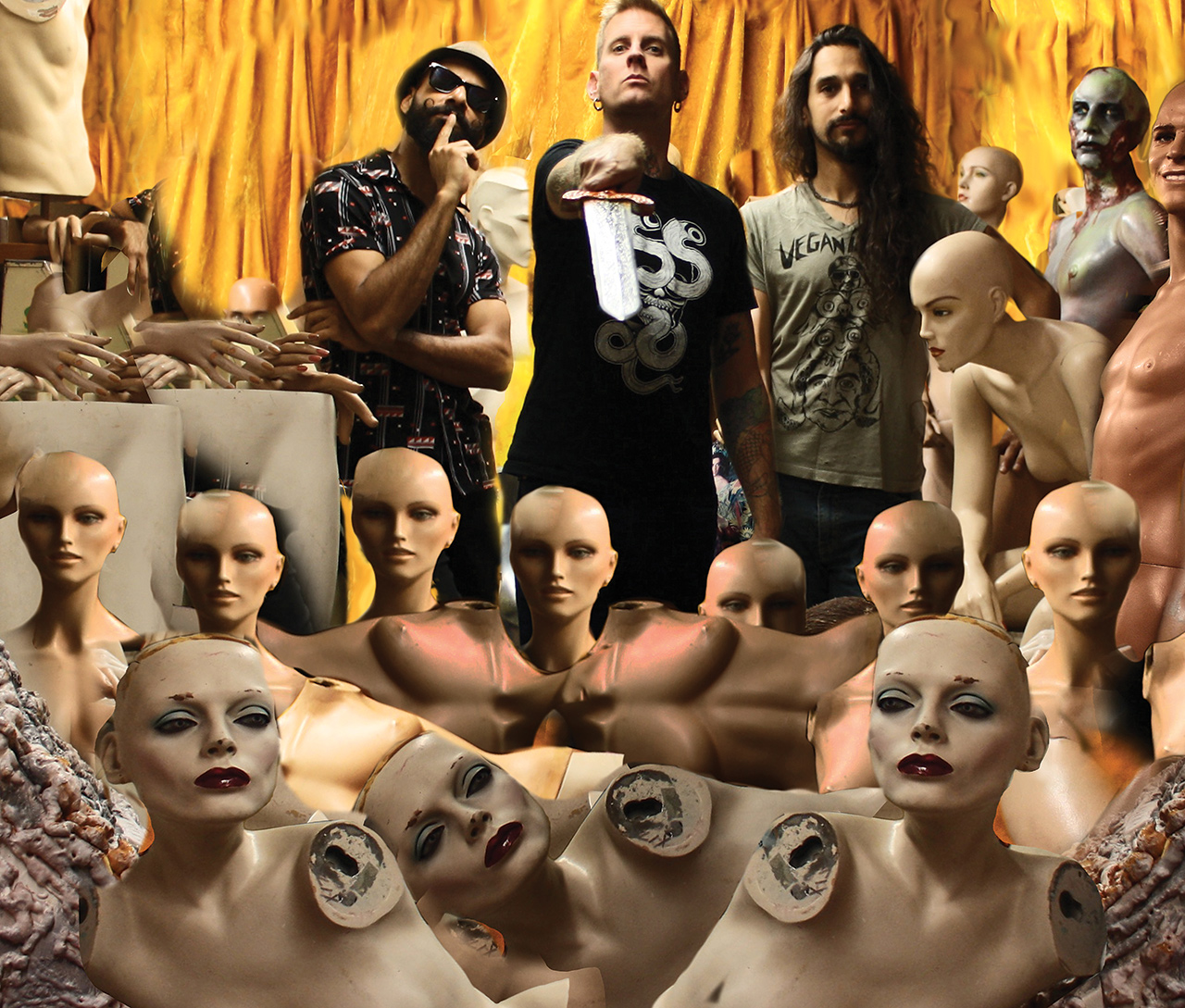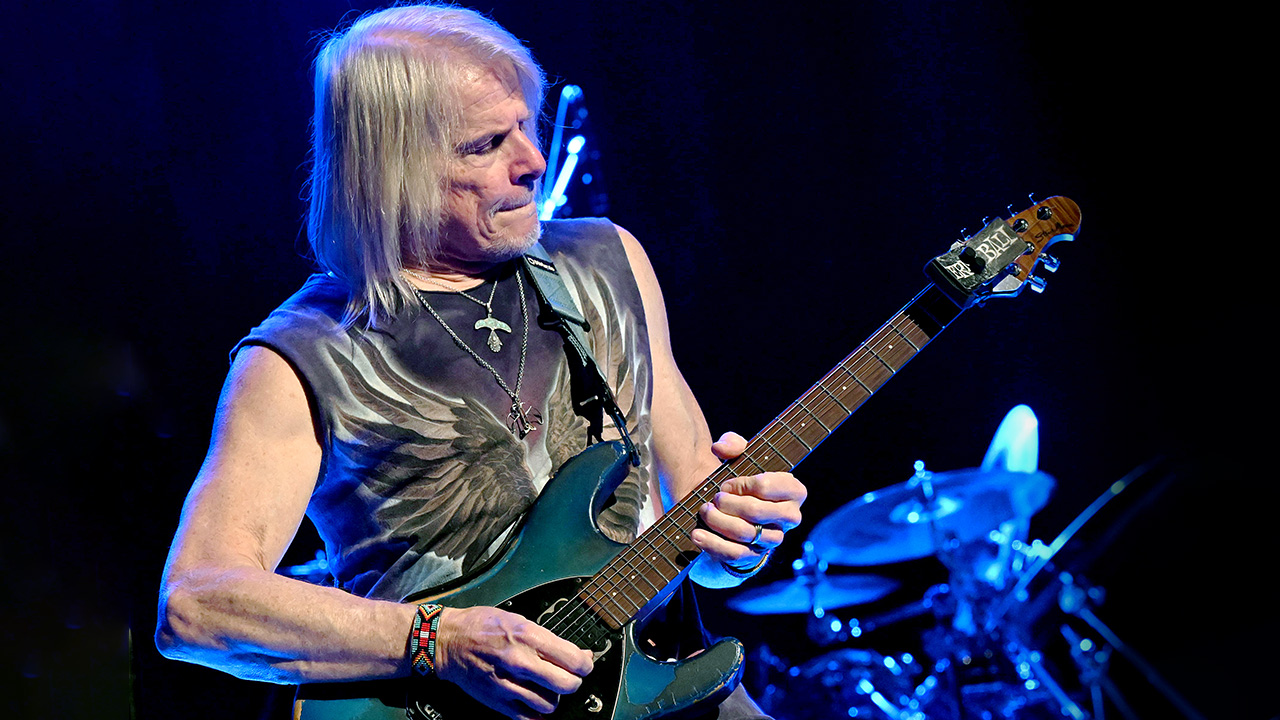Return of the synth: Introducing Mastodon side project Arcadea
The music of the 80s has seen a resurgence in recent years, and the latest convert to these nostalgic sounds is Mastodon’s Brann Dailor, with his synth-heavy prog rock side project Arcadea

With the world in a state of flummoxed turmoil, music fans can surely be forgiven for indulging in a little nostalgic regression. With that in mind, the recent resurgence in enthusiasm for the sizzling, synthesised sounds of the early 80s makes perfect sense: within the bubbling hiss of old school synths lies a familiar and yet curiously timeless sound that evokes memories of classic horror flicks, televisual schlock and the unerring allure of skewed dystopian visions. But not until the arrival of Arcadea – effectively a synth-driven prog rock trio, powered by Mastodon drummer Brann Dailor – has the synth been employed with such vigour and vivacity. A mere few seconds into the tooth-rattling opening track on Arcadea’s self-titled debut, it’s obvious that something entirely new and yet irresistibly nostalgic has been spawned. As Dailor explains to Prog, the whole bewildering enterprise stems from a long-held and localised passion for making strange music.
“This whole thing was started by my buddy Corey [Adams],” the drummer states. “I played with him in a band in Rochester, New York, where I grew up, called Gaylord. Both of us were super into old Genesis and that whole sweet spot of prog from the early 70s to the mid 70s… and Stevie Wonder too! So we share that history, and Corey’s a real unique player. Three years ago he approached me and said that he had bought this keyboard and he’d written three or four songs with just keyboards, and did I want to check ’em out and maybe play on them? It sounded cool. I love synth-based music and I’ve always liked electronic music, from being a kid and listening to Brian Eno records up through the keyboard work on all the Genesis stuff, the Tony Banks and Rick Wakemans and all that, and the keyboard stuff seemed to be a lot of my favourite moments in those songs. So he played me a couple of songs and it was pretty rad.”
Although Arcadea is an unapologetic side project, Dailor is eager to stress that despite his hectic schedule with Mastodon, the uniqueness and strength of this new and strange music was impossible to resist.

“Mastodon is so all-consuming and I have a wife and people that I miss when I’m gone, and they miss me! So the last thing I want to do is finish with Mastodon and then go and do something else that’ll take me away from those people,” he shrugs. “But I really liked this stuff and I thought it was unique and something that I wanted to be involved in. If you play music, I feel that every person should put out as much music as they want and do what they want. That’s how it should be. If it’s in you musically then you should put it out. There should be as much music in the world as possible.”
Perhaps the most striking thing about Arcadea’s debut album is how Dailor’s drumming fits so perfectly with the dizzying barrage of squelching and bleeping synths around him. Instantly recognisable and yet subtly different from his approach to Mastodon material, Dailor’s performance – both as drummer and vocalist – is a revelation, and gives songs like Gas Giant a distinct identity that sets them apart from the ongoing explosion of so-called synthwave acts, while still retaining that important connection to the world of sci-fi soundtracks and electro-psychedelia from which the entire synth renaissance has emerged. For Dailor, creating the songs on Arcadea simply provided him with an opportunity to do things a little differently.
“Basically, I don’t have as many drums in this band!” he laughs. “I stripped my kit down, I wanted to challenge myself and have a different set-up. I’m a feel drummer. I go with what’s resonating with me and what works best with the song, so I didn’t change too much. I tried to lay back a little bit, but it’s hard for me. I want to put fills everywhere because that’s what I hear and I’m super busy all the time. But there’s a real pulse to this stuff and I wanted to make sure that was there, that real driving, straight-ahead, bullet train type of vibe. I just tried to get the feel for it all and, you know, drum appropriately!” [Laughs]
- Mastodon's Brann Dailor talks twerking and why he loves prog
- Arcadea - Arcadea album review
- The TeamRock+ Singles Club
- TeamRock Radio app back on Apple’s app store
The absence of guitars on Arcadea is also an obvious talking point. Somehow, these songs really rock, whether due to Dailor’s powerhouse drumming or the frequently insane intensity of layered synths played by Corey Adams (or ‘Core Atoms’ as he is known for this project) and the band’s third member, Raheem Amlani, and yet the sonic texture of something like berserk album opener Army Of Electrons is entirely synth-driven: an approach that seems to confirm that guitars need not necessarily be the discerning prog band’s weapon of choice.
Sign up below to get the latest from Prog, plus exclusive special offers, direct to your inbox!
“Yeah, I found that interesting too,” says Dailor. “That was our goal, to just use keyboards. There was some temptation to throw some guitar in there, but we thought, ‘No, let’s stick to our guns!’ I’m already in a guitar-orientated band, you know? Mastodon couldn’t really be more guitar-orientated! So if I’m going to do something else, it needs to be completely different to the thing I’ve been doing for the last 18 years. Mastodon does quench a lot of my musical thirsts. We’ve had a bit of synth on our records and I love that stuff and I do crave more of that keyboard thing. Arcadea proves that you can do it without guitars, I think.”
He’s right, of course, but it seems fairly likely that a few Mastodon fans will be confounded by the lack of guitars and not know quite how to take Arcadea’s frenzied synth worship on board…
“Oh yeah, for sure! I remember being a teenager and watching an Iron Maiden documentary and there was a guy on there saying [adopts stern German accent] ‘You can’t play heavy metal music on the synthesiser!’ He was upset at Maiden because they dared to use synthesisers in their heavy metal! I guess things are different now, but yeah, you can’t please everybody.”
Speaking to Brann Dailor, it’s more than apparent that he is an irrepressible music nerd with the magic of the synthesiser coursing through his veins. He speaks excitedly about the classic prog albums that he grew up listening to, with particular reference to the efforts of Tony Banks, Rick Wakeman and other luminaries of prog’s first wave, while also referencing the electronic music boom of the early 90s, wherein acts like Orbital and Aphex Twin confounded the dance music status quo by injecting progressive ideals into an often conservative musical format. He goes on to theorise that the current resurgence of interest in synth-based music, from the pummelling synthwave of artists like Perturbator and Carpenter Brut through to the more cerebral electro-psychedelia of Zombi and the much-celebrated Stranger Things soundtrack, is an inevitable product of time elapsed and the cyclical nature of culture.
“It’s definitely a generational thing,” he notes. “You know how things come in waves? Well, enough time has passed and everything comes back around and now it’s got a new spin on it. The Stranger Things soundtrack just landed in that particular sweet spot and everyone was in the right place and really ready for it, and it recalls something for us 40-somethings who were there in the early 80s with horror movie soundtracks and all that stuff. Those synth tones are very familiar and they’re like the grandma’s meat loaf of music! It’s everybody’s favourite security blanket. So it makes sense that it’s coming back around.”
From its eye-frazzling artwork and convoluted sci-fi concept to the skittering, analogue synth furore of its musical contents, Arcadea is as much a celebration of prog’s synthesised soul as it is an unprecedented detour into virgin sonic territory. It’s also one of the most fervently idiosyncratic records you will hear in 2017, and even though Dailor’s day job is guaranteed to keep him exceptionally busy for the next few years, the drummer does seem to be sufficiently exhilarated by his new venture that Arcadea promises to gain its own momentum and, if the stars align, may be hitting a sweaty venue near you in the not too distant future.
“I’m definitely not thinking that we’ll get in a van and play the clubs and go on tour, but a couple of shows here and there would be cool,” he concludes. “We’ll see what happens when the record comes out and if people really respond to it, then who knows? It’s a big maybe! But I hope we get to play at least one show. I know that Corey and Raheem really want to, and so that would be cool for them as well. Mastodon takes up the majority of my time, but whenever I get the chance and if it’s something that I love, I’m gonna do it.”
Arcadea is out now via Relapse Records. See www.facebook.com/arcadearocks for more information.
Mastodon's Emperor Of Sand voted the best metal album of 2017 so far

Dom Lawson began his inauspicious career as a music journalist in 1999. He wrote for Kerrang! for seven years, before moving to Metal Hammer and Prog Magazine in 2007. His primary interests are heavy metal, progressive rock, coffee, snooker and despair. He is politically homeless and has an excellent beard.
